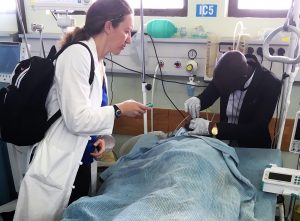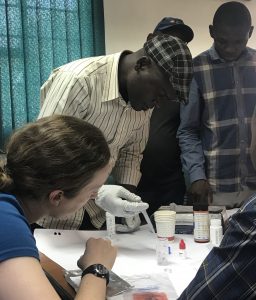New diagnostic tests could offer a quicker diagnosis for impaired kidney function, not only for people in Africa, but in other places with limited resources, as well as disaster events like hurricanes and earthquakes that affect people around the world. In December, 2017, Erica Bjornstad, MD, MPH, a third-year pediatric nephrology fellow, received a funding award from the International Society of Nephrology to study the epidemiology of acute kidney injury (AKI) in a Malawian trauma cohort. The UNC Kidney Center matched this funding, and now Bjornstad’s project is well underway at Kamuzu Central Hospital, in conjunction with UNC Project Malawi and the UNC Department of Surgery’s Malawi Surgical Initiative.

AKI refers to a sudden decrease in kidney function and it requires immediate treatment. AKI causes a build-up of urea and other nitrogenous waste, and this makes it difficult for the kidneys to keep the right balance of fluid and electrolytes. Few studies have evaluated AKI in trauma patients in Africa, despite trauma being the number one cause of death in young people across the continent.
“We know that for people in Malawi, there are a lot of injuries from road traffic accidents, burns and falls, particularly children,” said Bjornstad. “When muscles break down from such injuries, toxins are released that gum up the kidney, and this can lead to renal failure. What we don’t know is how many of these traumas are leading to AKI or renal failure due to limited diagnostic tests.”
Unlike chronic kidney failure that results from kidney damage that gets worse slowly, AKI can be reversed if it is found and treated quickly. But in places with limited resources, with different comorbidities and different access to medications and health care, a fast, reliable diagnostic test is virtually nonexistent. In addition, with each episode that occurs, a patient’s chances of experiencing chronic renal failure can increase. Bjornstad adds that in Malawi, there is an under recognition of what to do after an injury to prevent AKI. She wants to address this knowledge gap with education.
“AKI occurs in approximately 30% of South African trauma patients, but we don’t know how many in Malawi. We do know that it’s one of the poorest countries in Africa with a very high trauma rate. We also know that repeated episodes of AKI lead to an increased risk of chronic kidney disease that is difficult to effectively manage, with usually no hope of getting a transplant.”
Seeking a Rapid Diagnosis.
Laboratory blood testing is the standard for diagnosing AKI, but in places like Malawi, laboratory technology is expensive. Bjornstad says dipsticks offer another avenue for a rapid diagnosis.
Working with Dr. Anthony Charles, leader of the UNC Malawi Surgery Initiative and associate professor of surgery acute care, Bjornstad is investigating the viability of two novel diagnostic dipstick tests that she hopes will enable a quicker diagnosis in limited resource settings. One test measures the diagnostic performance of a dipstick in urine for a novel biomarker, NGAL.

“If we can prevent kidney disease upstream, then we can potentially prevent the downstream effects, as well as the need for dialysis and transplants. At this time, only 80 patients throughout Malawi can have access to dialysis treatment, based on hospital capacity. There is no ability for transplants in the country or even in neighboring countries.”
Bjornstad will be back in Malawi this fall to review data from 480 participants–comprised of adults and children–and will focus on a treatment algorithm that can improve care.
“If our tests are promising, we’ll be able to aid not only the people in Africa, but also people in other places with limited resources, and disaster events, such as hurricanes and earthquakes, that affect people all around the world, including the US and North Carolina.”
Bjornstad adds that AKI can be treated with IV fluids and careful management that avoids medications that make it worse, preventing patients from having acute kidney failure altogether. But the higher the injury, the harder it is to manage. The more episodes a patient has, the higher the risk for renal failure.
“We know that after the recent hurricane in Puerto Rico, there was a long delay before routine laboratory facilities were back online. Having a method for diagnosing AKI in such settings will be extremely valuable.”